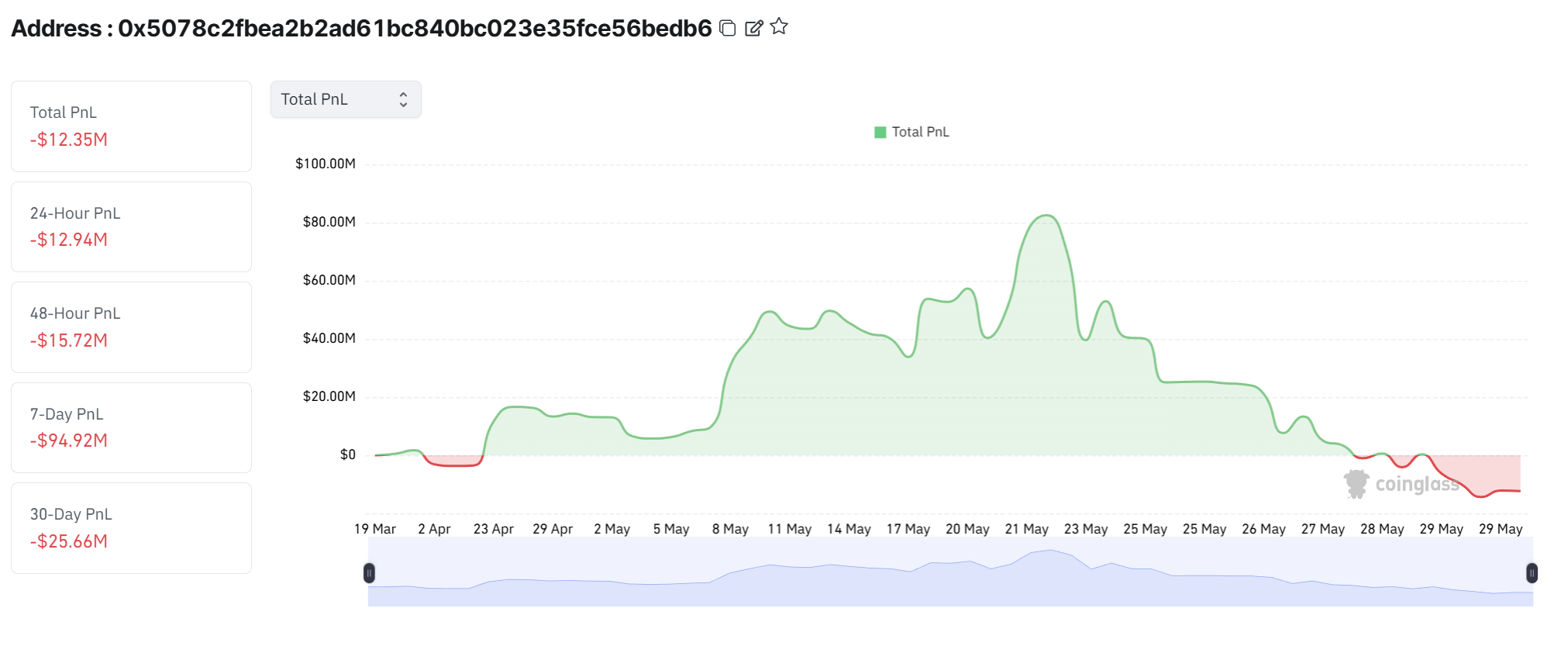Uncategorized
Sui Network Steps in to Compensate Cetus Losses in Full After $223M Exploit

Cetus Protocol, the largest decentralized exchange (DEX) on the Sui blockchain, has secured a loan from the Sui Foundation to compensate users in full following a $223 million exploit last week.
These funds apply only to cover the bridged assets, and are separate from the frozen funds subject to an onchain community vote.
“Using our cash and token treasuries, we are now in a position to fully cover the stolen assets currently off-chain if the locked funds are recovered through the upcoming community vote,” Cetus said in an X post.
“This includes a critical loan from the Sui Foundation, making a 100% recovery for all affected users possible.”
The recovery plan hinges partly on the outcome of a pending on-chain governance proposal, which would authorize the use of frozen funds to complete user reimbursements.
“These are extraordinary measures taken to protect the Sui community,” the Sui Foundation said in a statement, adding that a “full recovery is possible” with the community’s support.
The exploit of Cetus last week involved an attacker manipulating spoof tokens, such as BULLA, to exploit flawed price curves and reserve logic, allowing them to drain SUI, USDC, and other real assets from liquidity pools without depositing equivalent value.
At the time, over $162 million in stolen tokens were frozen on-chain, while the remainder were bridged out through multiple paths. The attacker’s wallet (which is still active) was last seen holding over 12.9 million SUI, with additional assets likely swapped or obfuscated across networks.
In response, Cetus paused its smart contracts and initiated an investigation, while its governance token, CETUS, dropped nearly 40% at the time. Trading activity across Sui’s DeFi ecosystem slowed amid liquidity concerns and broader scrutiny of protocol safety.
Now, with the new secured loan from the Sui Foundation, Cetus says it is in a position to begin reimbursing users immediately.
Uncategorized
Bitcoin Bull James Wynn Close to Total Liquidation as Losses Near $100M

James Wynn, the Hyperliquid trader who had at one time a billion-dollar notional position, has become an outsized victim of bitcoin’s BTC cooling sentiment.
Wynn’s current highly leveraged BTC position, which he appears to be struggling to maintain, spiralled into a loss of nearly $100 million over the last week.

Data from Hyperdash shows that Wynn’s margin usage is nearing 100%, which would result in a total liquidation of his position, though Wynn recently made a deposit of $376,000 to bolster his defenses.

The trader, known for making aggressive bets under the pseudonym «moonpig,» currently holds a long position of approximately 1,690 BTC, valued at roughly $178.78 million.
On-chain data shows that Wynn’s 40x leveraged BTC bets now carry an unrealized loss of approximately $3.5 million, representing a negative return of 77%.
But with BTC trading near $106,000, just slightly above Wynn’s liquidation price of around $104,607, any further decline in the asset’s price could trigger automatic forced sales.
Uncategorized
Crypto Staking Doesn’t Violate U.S. Securities Law, SEC Says

Crypto staking, under certain circumstances, does not appear to implicate U.S. securities law, a branch of the U.S. Securities and Exchange Commission said late Thursday.
The SEC’s Division of Corporation Finance published a staff statement — the latest in a series from the regulator — spelling out how the regulator may evaluate proof-of-stake networks, mainly noting that covered activities do not «involve the offer and sale of securities» — meaning the SEC won’t sue any person or company participating in those activities.
Node operators and validators, custodians, delegates, nominators and entities staking assets either on their own, staking directly with a third party or staking on behalf of an asset’s owners fall into this bucket, the staff statement said. In this, the SEC seems to suggest that staking will be treated identically to mining, the consensus mechanism securing networks like Bitcoin BTC, which the SEC clarified also did not implicate securities laws in a similar staff statement last month.
The SEC’s staff statement was «very clear for a subject that can be a little bit complicated,» said Lorien Gabel, the CEO of staking-focused crypto firm Figment. And its main upside appears to be saying that various activities U.S. companies might have shied away from in the past are okay now.
«They included some ancillary staking activities. For example, we provide insurance around slashing [and we also provide] modified unbonding periods,» he said. «And they said that actually doesn’t mean that you’re a manager of assets as a staking provider.»
The SEC statement said companies that want to provide those types of services, or even pooled staking, can do so, he said.
Thursday’s statement is an incremental but important update from the regulator, said Alison Mangiero, the head of staking policy at the Crypto Council for Innovation.
«This reaffirms that there’s going to be similar treatment for stakers that there is for miners. And I think it’s especially important because, given under [former SEC Chair Gary] Gensler, there were so many enforcement actions that were focused on staking as a service … we saw a lot of those cases dismissed, and the Coinbase case dismissed with prejudice,» she said. «We assumed that this would be the stance, but actually having a staff statement that asserts it, I think is crucially important.»
The fact it came just days before the SEC faces a deadline on a number of applications to bring staking into spot ether ETH exchange-traded funds (ETFs) is telling, she said.
It’s likely that the ETF providers would have received staking approvals regardless, but the SEC statement will likely start speeding up the process for securing those approvals, Gabel said.
As with the SEC’s previous staff statements, Thursday’s included a footnote clarifying that it is very narrowly tailored and certain restrictions would apply. It is not a replacement for rulemaking done through the actual commissioners and «has no legal force or effect,» the footnote said.
«This statement only addresses certain activities involving Covered Crypto Assets that do not have intrinsic economic properties or rights, such as generating a passive yield or conveying rights to future income, profits, or assets of a business enterprise,» another footnote said.
Uncategorized
Fastex Expands U.S. Presence With Los Angeles Office

Fastex, a Dubai-based crypto exchange, is expanding its presence in the U.S., building out an office in Los Angeles, California.
According to a Thursday announcement, Fastex will offer spot crypto trading services of tokens including bitcoin BTC, ether ETH, Cardano ADA, Solana SOL and its native utility token, Fasttoken FTN, to both retail and institutional investors in the U.S.
Fastex’s American expansion comes as the U.S. continues to overhaul its approach to crypto regulation under President Donald Trump’s administration. Since Trump took office in January, the U.S. Securities and Exchange Commission (SEC) has retreated from the so-called regulation-by-enforcement approach to crypto it took under former Chair Gary Gensler, dropping a host of open investigations and closing ongoing litigation against crypto exchanges.
In an interview with CoinDesk at Bitcoin 2025 in Las Vegas, Fastex’s Chief Legal Officer and board member Vardan Khachatryan said that the SEC’s softened stance toward crypto regulation played a major role in the exchange’s decision to expand in the U.S., though he acknowledged that there is still no concrete legal framework for crypto in the country.
“There has been enough of a policy change, at least in terms of [how the U.S. government is] viewing things, that allowed us to go for this,” Khachatryan said. “It’s still kind of a risk, but it’s a lower risk.”
With a host of crypto companies returning to the U.S. due to the Trump Administration’s crypto-friendly policies, cities like New York are hoping to attract companies expanding to the U.S. to set up shop in their jurisdictions.
But, while Khachatryan said New York would be “the right place to be in terms of headquarters,” he said that, for now, the prospect of obtaining a BitLicense — the notoriously difficult-to-obtain crypto license issued by the New York Department of Financial Services (NYDFS) — is prohibitive.
“I hope that things will change a bit,” Khachatryan said.
New York City Mayor Eric Adams, who has branded himself the “Bitcoin Mayor” in an attempt to lure crypto companies to New York, called for the end to the BitLicense regime during a speech at Bitcoin 2025 in Las Vegas on Wednesday.
Read more: NYC Mayor Eric Adams Calls for End of the NYDFS BitLicense, Proposes BitBond
Fastex is currently headquartered in Dubai, in the Dubai International Financial Centre (DIFC). Khachatryan said the exchange is currently working on obtaining a license from Dubai’s Virtual Assets Regulatory Authority (VARA).
After expanding in the U.S., Khachatryan said the exchange also has its eyes on a Latin American expansion, starting with Brazil, followed by Argentina and Mexico.
-

 Fashion8 месяцев ago
Fashion8 месяцев agoThese \’90s fashion trends are making a comeback in 2017
-

 Entertainment8 месяцев ago
Entertainment8 месяцев agoThe final 6 \’Game of Thrones\’ episodes might feel like a full season
-

 Fashion8 месяцев ago
Fashion8 месяцев agoAccording to Dior Couture, this taboo fashion accessory is back
-

 Entertainment8 месяцев ago
Entertainment8 месяцев agoThe old and New Edition cast comes together to perform
-

 Business8 месяцев ago
Business8 месяцев agoUber and Lyft are finally available in all of New York State
-

 Sports8 месяцев ago
Sports8 месяцев agoPhillies\’ Aaron Altherr makes mind-boggling barehanded play
-

 Entertainment8 месяцев ago
Entertainment8 месяцев ago\’Better Call Saul\’ has been renewed for a fourth season
-

 Sports8 месяцев ago
Sports8 месяцев agoSteph Curry finally got the contract he deserves from the Warriors





